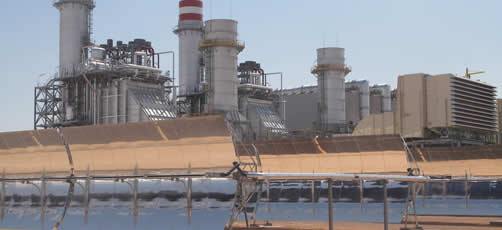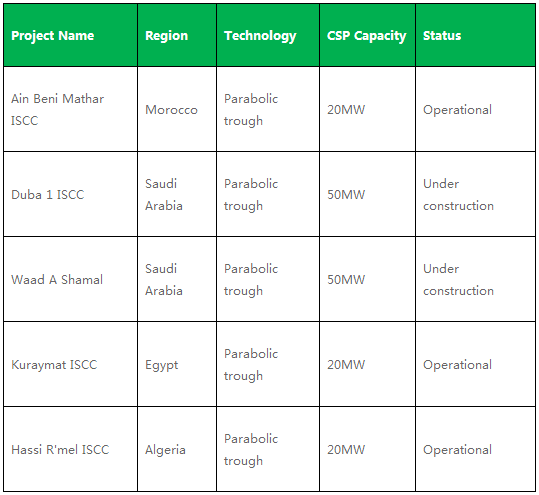
Under the management of Saudi Electricity Company (SEC), Saudi is planning its first ISCC project combined with CSP---Duba 1 ISCC power station. The project will mostly utilize F-class gas turbines for energy generation, with the concentrating solar parabolic trough. The parabolic trough will generate 50 MW of the plant's total 605 MW of capacity. Duba 1 will be the largest integrated CSP capacity in the Arabian Gulf region once it’s completed by 2018.
As construction starts on the Duba 1 plant, work is progressing simultaneously on the other ISCC project in the kingdom: the 1,390 MW Waad Al Shamal plant with 50 MW CSP.
As SEC indicated, “We got the cheapest CSP cost per installed kilowatt from Duba 1 and Waad Al Shamal – less than $1,600/kW, meaning the capital cost of the solar thermal facility is projected to be less than half the lowest CSP cost achieved up until now. By comparison, the capital cost for stand alone parabolic-trough plants without storage currently ranges from $3,500/kW to $8,000/kW, according to IRENA’s report.
Building ISCC facilities is clearly the preferred route for SEC when it comes to implementing CSP, allowing the company to gain construction and operation experience without taking significant risks.
“ISCC plants aren’t cheaper than combined cycle plants, but they’re much cheaper than standalone CSP,” “Waad Al Shamal and Duba 1 will produce the cheapest CSP worldwide; this is the main driver for SEC.”
SEC signed 2.5 billion riyals contracts for Duba 1’s construction and operation with Spanish company Initec Energia and SSEM (Electro Mechanic Work) in 2015, and a contract of 3.68 billion riyal with GE for Waad Al Shamal ISCC plant. Both plants are under construction and expected to be operational in early 2018.
During the upcoming CSP Focus MENA 2017 Sept.13-14 Dubai conference, Mr. Hamed Al-Saggaf, Executive Director of Saudi Electricity Company will make a key-note speech about SEC’s CSP and ISCC strategy. More information about the event speakers and topics are listed at the bottom.
Middle East & North Africa (MENA) has been witnessing the grow-up of integrated solar combined cycle (ISCC) application. The hybrid of solar CSP and gas seems to be a quite competitive choice for CSP players while working with a standard generating technology. The reason could be most likely attributed to the cost.
On the other hand, the combined cycle of CSP and traditional power plant enhance the confidence of investors and bankers, paving the way for financing in most cases. What’s more, the ISCC plants make use of local solar resources, meanwhile help save the gas and petroleum.
ISCC plants show lots of advantages in MENA. Currently, most of the countries still rely highly on fossil fuels due to the huge reserves, but they are also facing threats from climate change and energy transition process.
Several gas plants in MENA region are supposed to be potentials for solar filed integration due to their availability for sufficient neighboring land and distance from shore. They are mainly located in Saudi Arabia, Morocco and Algeria, Egypt etc.
Ain Beni Mathar ISCC plant is the world’s first ISCC plant which was commissioned in Morocco in 2011. The complete plant has an output of 450 MW (combined cycle) + 20 MW (solar field).

